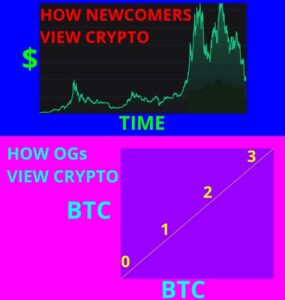by Aaron R K

Some have said that, for crypto, there’s never a bear market: one bitcoin will always be worth a bitcoin.
Appreciation for this disruptive technology is now widespread, but it wasn’t always this way. I remember a time, not long ago, when BTC was described as being used by criminals, and when banks were skeptical about crypto-related transactions. How times have changed! Multiple spot Bitcoin ETFs have been approved by the U.S. Government, and in a local supermarket, a short walk from my home, a large machine by the front door advertises BTC and altcoins for cash. At the local bank I overhear a pleasant, positive conversation between a bank employee and a customer about crypto and Coinbase.

Crypto went mainstream! And the network became so clogged up with transactions that it was too expensive to use! According to my wallet, I sent almost $39 worth of BTC, but paid over $68 dollars in fees! I tried to adjust the network fee level in my wallet, and this low-fee transaction resulted in a stuck transaction, and the wallet could not send Bitcoin for days! The wallet that I used for sending and receiving this BTC was Trust Wallet, among the most popular of crypto wallets.
I saw very high transaction fees on other wallets as well. How could this happen? I thought that, these days, we use the Lightning Network, so sending Bitcoin is fast and cheap. I’ve heard of how people in El Salvador save money by sending BTC instead of dollars. The last time that there was an intense crypto bull market, it was still cheap for me to send Bitcoin. Maybe I was unlucky with my transactions that week, but if the fees I paid were representative of the network, then BTC is not yet ready for prime time, in my opinion.
Don’t get me wrong, I view BTC as a valuable asset that promises to make a huge, positive impact on the world economy. Michael Saylor markets Bitcoin as the world’s best financial asset, and it may just be that. Some people go a bit far in their appreciation for this electronic coin: I once saw an interview with Robert Breedlove, in which he stated, more or less, that BTC would be the single main crypto asset, with little or no room for other forms of cryptocurrency, though he did not provide any good reason as to why this should be the case. Max Keiser is in the same BTC-maxi club.
However, as much as I dig Bitcoin, and have great expectations for it, I’m in no way a maxi.
Bitcoin is for sure a star, but there is room for many stars in the great galaxy of internet and finance.
I have some familiarity with BTC, and while I haven’t run a real Bitcoin node, I ran a BTC testnet node, using a CLI interface (an interface in which you type in commands, instead of clicking on icons). BTC is amazing technology! However, its star status as a difficult-to-produce, rare asset, has led to a relatively centralized system of production and transaction validation. This is because of the high cost of mining equipment and electricity bills associated with BTC, which has put most of the the coin production and network transaction validation into the hands of those individuals and organizations rich enough to afford them. A more affordable, widespread (in other words decentralized) means of production, for example that promised by Bitcoin Gold, and by various cryptocurrencies associated with decentralized physical infrastructure, such as Helium, provides a welcome alternative for those who cannot afford the specialized mining equipment and massive electrical bills of Bitcoin (in other words, probably most people). One may of course buy a part of a BTC mining facility, and I have seen a heater that not only warms the home, it also produces Bitcoin! But the vast majority of BTC mining and transaction validation is relatively centralized among that class of investors who can afford the high costs of entry and maintenance.
I feel that there’s a real need for digital assets produced with easily affordable devices, like Bitcoin Gold, Helium, etc., as well as assets that are inexpensive to use, such as Litecoin. There’s no reason why such assets cannot share the spotlight with Bitcoin, and perhaps they may even one day provide greater benefit to society than a first-generation cryptocurrency like BTC.
I would like to share an excerpt from an article I wrote, that introduces crypto-newcomers to altcoins. The title of this section of the article is “Why Bitcoin Alone is Not Enough”. It states my feelings about why the world is better off with a variety of crypto assets, as opposed to just BTC.
WHY BITCOIN ALONE IS NOT ENOUGH
There are many reasons why altcoins are vital to a proper market of diverse cryptocurrencies. Bitcoin, like many first-generation cryptocurrencies, is produced on computer devices called miners. At the time of writing, it is very expensive to produce new Bitcoin, because doing so requires expensive digital equipment, and large amounts of electricity. In theory, BTC as a network system is decentralized. However, in practice, ownership of network nodes (the devices which confirm transactions, run the network and produce new BTC) is concentrated in the hands of a relatively small number of individuals and organizations, that have the financial means to purchase an run such expensive hardware, and pay the cost of huge electricity bills. In this sense the BTC network is relatively centralized, as the ownership and management of large nodes is beyond the means of the average investor. These miners produce new BTC, and they are also responsible for validating transactions. Miners can choose to prioritize transactions which provide high network fees, validating them, before validating those of other users. This is fair, but can get out of control, potentially undermining BTC’s overall value to society. When network traffic is high, these relatively centralized miners, prioritizing those willing to pay much higher fees (in a situation that almost amounts to bribes for validating transactions) can request fees approaching the price of the actual BTC being sent. Paying fees that are nearly as high as the actual amount of crypto sent is a poor example of “money for the people”. To the degree that users are subject to such high network expenses, BTC is not a proper peer-to-peer currency, since rich BTC miners operate as effective middlemen, with slow speed, and far higher service fees than traditional bankers. The word “greed” comes to mind… Additionally, when network traffic is high, transactions with low fees can be completely ignored by miners, whose job it is to validate transactions. The result is stuck transactions, which can cause some crypto wallets to become unable to send BTC for days. There are solutions to these problems, such as better wallets and additional networks which can be used to scale BTC more efficiently. However, a number of altcoins have been created that already solve these problems to varying degrees, providing low transaction fees, and allowing individuals with normal incomes to more effectively participate in the production of new cryptocurrency.
That being said, some altcoin networks, especially Ethereum, have similar problems to BTC, such as overly high network fees. The crypto space is still young, still evolving and improving. BTC and Ethereum are valuable networks, but it is beneficial to have a wide range of alternatives. The availability of multiple altcoin networks, with their own contributions to the crypto space, is itself a form of decentralization.
Disclaimer: This information here, and elsewhere on the website, is provided for entertainment, educational use, and the sharing of opinions and individual observations. This is not provided as advice from a financial advisor. The writer, SurfWeb3.com and/or its partners may own &/or have a financial interest in any or all of the items discussed on this website, &/or on connected social media platforms. There is no endorsement, nor any guarantee of quality, of items referred to on this website, including links, advertisements and affiliate relationships. The user of this site does so entirely and solely at his or her own risk. Please take personal responsibility for your investments, and do your own research.


